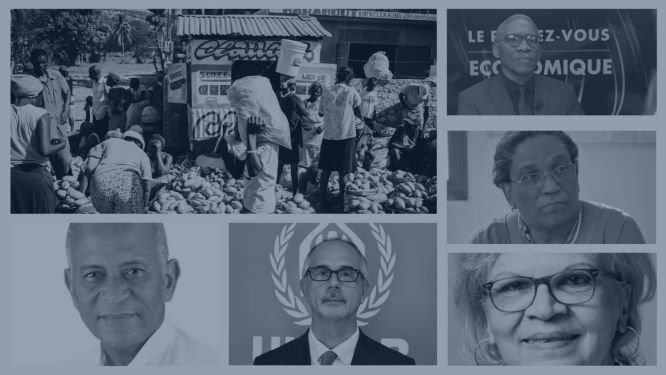New Bipartisanship Over Haiti is Promising
The sudden U.S. presidential unity on Haiti is promising, because Haiti has long been the subject of bitter partisan bickering in Washington.
This post is also available in: Français
On October 25, 2022, Think Tank Haiti (TTH) - a joint collaboration between Université Quisqueya and the Inter-American Dialogue - hosted a webinar titled “Haiti’s Frustration with International Aid.” During the event, prominent Haiti scholar and sociologist, Michèle Oriol, discussed her recent paper “International Aid or Foreign Policy? Lessons Learned since 1990” and her findings. Rector of Université Quisqueya Jacky Lumarque offered welcome remarks while Former Prime Minister of Haiti and Current President of Fondasyon Konesans Ak Libète (FOKAL) Michèle Duvivier Pierre-Louis moderated the event.
Michèle Oriol commenced the webinar by discussing the basis for her study. While international donors are experiencing “Haiti fatigue,” Haitians, too, are fatigued from the lack of results over decades of aid influx. To analyze this mutual fatigue, Oriol conducted a historical overview of international aid sent to Haiti since the 1970-1980s and traced how Haiti has gone from a “developing economy” to a “fragile state.” Oriol discussed the important presence of new actors – such as various peacekeeping missions and humanitarian groups – and new sectors of aid activity – including education, development, elections, disarmament, and natural disasters.
In addition to outlining the lack of continuity among aid projects, the lack of sufficient funding, and defining the competitive relationship that exists between the Haitian state and international donors, Oriol presented three major conclusions:
Kesner Pharel, chief executive director of Groupe Croissance, helped provide an overview of how international aid affects the Haitian government’s budget. Since the 2010 earthquake and subsequent influx of foreign aid, aid fell consistently – reaching a nadir in the 2017-2018 fiscal year. This aid has come in the form of grants and projects with minimal budgetary assistance. However, since Covid-19, international aid has rebounded particularly in the form of fiscal support. Pharel also implored the Haitian population and civil society to question how the budget is being used and highlighted two important elements to keep in mind: social injustice and both indirect and direct taxation.
From his viewpoint, the United Nations High Commissioner for Refugees' (UNHCR) Representative in Uganda Joël Boutroue drew attention to what he called the “bureaucratization of aid.” This tendency to bureaucratize aid efforts has led to a lack of risk-taking, a smaller global vision for aid, undermines the agency of the Haitian state, and avoids complex, but important, issues like governance and corruption. Furthermore, Boutroue lamented the project-management focus of aid in Haiti and how short political timelines among the large donor agencies have led to short-term thinking. Boutroue, however, recognized that the responsibility for failed international aid programs lies also with the Haitian state itself and the poor management by those within the Haitian state implementing development projects.
Moving to the Q&A portion of the event, panelists discussed several issues relating to international aid. Panelists discussed the urbanization and growth of Haiti’s population over the past few decades and how the lack of effective management of such a societal change has led to fewer opportunities for Haiti’s youth. Panelists also discussed how remittances can act as a double-edged sword. On the one hand, remittances cause inflationary pressure, and are generally spent as consumption, on the other hand, remittances have a certain potential to use as a source of credit for Haiti as well as alleviate conditions for Haitians currently in poverty.
Offering closing remarks, Michèle Oriol agreed with the panelists that it is important for donors to be determined and ambitious. However, she added, it is also important to understand the geopolitical factors that affect aid allocation, such as migration.
To close the discussion, Jacky Lumarque underscored the large influence international donors have on public action in Haiti. Additionally, Lumarque noted that the Haitian state is being replaced due to poor public administration capacity within its government and the lack of connection between program planning and implementation. Lastly, Lumarque concluded that more must be done to turn Haiti into a welcome destination for foreign investment.
The sudden U.S. presidential unity on Haiti is promising, because Haiti has long been the subject of bitter partisan bickering in Washington.
The worldwide outpouring of support for Haitians from governments and ordinary citizens has been extraordinary. But this heroic phase of the emergency response is drawing to a close.
After a 7.0 magnitude earthquake struck Haiti, the aftershock reached China in ways that few anticipated.The earthquake forced Chinese leaders to navigate the tricky politics of disaster relief.
 Featured Image: Nathan Congleton/Flickr/CC BY-NC-SA 2.0
Featured Image: Nathan Congleton/Flickr/CC BY-NC-SA 2.0